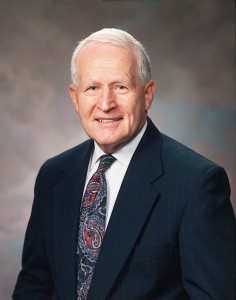By Elder Ben B. Banks
The Prophet Joseph Smith taught: “Happiness is the object and design of our existence; and will be the end thereof, if we pursue the path that leads to it” (History of The Church of Jesus Christ of Latter-day Saints, 2nd ed. rev., ed. B. H. Roberts [Salt Lake City: The Church of Jesus Christ of Latter-day Saints, 1932–51], vol. 5, p. 134).
As we walk the path the Prophet speaks of, sometimes we are accompanied by trial, adversity, disappointment, heartache, and discouragement. We are taught that we came to earth to experience mortality. As we deal with our challenges, temptations, pain, and sorrows, we learn to appreciate goodness, virtue, and happiness.
Recent events have illustrated once again why we need a source of comfort and hope in our lives.
After John Clifford of Cork, Ireland, heard about the terrorist attacks on Sept. 11, his first thoughts were of his brother, Ronnie, who worked in the World Trade Center. John frantically tried to discover news of his brother. Just hours after finding out that his brother had indeed survived, John then learned that his sister, Ruth, and her four-year-old daughter, Juliana, had been on board one of the aircraft that crashed into the World Trade Center towers (“Corkman Tells of Brother’s Escape,” Irish Times, Sept. 13, 2001.).
What message of comfort can we as Latter-day Saints offer those who mourn? How do we deal with tragedy or adversity in our own lives? What is the solution to the ills that torment mankind?
The Savior Himself provided an answer to this question when He met with His Apostles on the night before His Crucifixion. He said: “Peace I leave with you, my peace I give unto you: not as the world giveth, give I unto you. Let not your heart be troubled, neither let it be afraid” (John 14:27).
The Lord notes a distinction between His peace and man’s peace. Man’s peace is usually identified as the absence of war. The Lord’s peace cannot be disturbed even in the midst of war. Even during His trial before Pilate, with the shouting multitude on one side and the doubting governor on the other, He was at peace. The Savior introduced this peace and showed us how to live with it.
Peace in this world comes from one source, our Savior, even Jesus Christ. Of that I bear testimony. Never forget it. No matter how great the trial, no matter how much the suffering, the Master can always bring the needed peace. His gospel stands as a beacon of light in a world darkened by the influence of evil.
As a pilot during World War II, President Boyd K. Packer was taught by his instructors to always wear his parachute when flying. At that time parachute packs were large and uncomfortable to wear. Yet as President Packer learned of colleagues saved by their parachutes as they escaped from damaged aircraft, he realized what wise counsel he had been given.
We all need a spiritual parachute in this world today—one that we can carry with us at all times, one that will protect us when we face personal trial and adversity, and one that will bring us peace when all about us are confounded. Our spiritual parachute has many elements that make up a wonderful protective canopy we can use in times of great difficulty. I will mention seven of those elements:
1. Follow the prophets. Several times a year we sustain 15 Apostles as prophets, seers, and revelators. We listen to them at general conference and read their words in Church magazines. They are a trusted source of wise counsel and direction. We would do well to heed their words. They are inspired men who care for you and want you to have peace and happiness in your life.
2. Be ye clean. President Hinckley has said: “Stay away from pornography as you would avoid a serious disease. It is as destructive. It can become habitual, and those who indulge in it get so they cannot leave it alone. It is addictive” (“Living Worthy of the Girl You Will Someday Marry,” Ensign, May 1998, p. 49).
You cannot have peace if you have allowed the insidious influence of pornography to envelop your life. If you have not followed the prophet’s counsel in this regard, get help. Get out of the “mist of darkness” (1 Nephi 8:23) and back onto that right path that will lead to eternal life.
3. Honesty is the best policy. Throughout my life I have witnessed acts of honesty that have required courage. Sometimes in business there can be a temptation to be dishonest to close a sale. Some say that it is all right to be less than honest. It is not. Once the reputation for dishonesty is generally known, it is very hard for the individual to be trusted again. Honesty is a character trait that should be at the very foundation of our lives.
4. Keep the Sabbath day holy. By keeping the Sabbath day holy we build spiritual character. Sometimes those we call close friends will encourage us to ignore this very important commandment. However, by observing it we will have power over evil, we will be more spiritual, and we will keep ourselves unspotted from the sins of the world (see D&C 59:9).
The Sabbath day provides an opportunity to step away from the world for one day to restore our spirituality so that we can get through the other six days.
5. Read and ponder the scriptures, and pray often. Elder Henry B. Eyring taught:
If you ponder the scriptures . . . , I can promise you that you will feel more love for God and more of His love for you. And with that, your prayers will come from the heart, full of thanks and of pleading. You will feel a greater dependence on God. You will find the courage and the determination to act in His service, without fear and with peace in your heart. [“Prayer,” Ensign, November 2001, p. 17]
There is great power in pondering the scriptures. Those who do this have the right to inspiration and revelation to guide them.
6. Serve others. The scriptures teach, “Be ye doers of the word, and not hearers only, deceiving your own selves” (James 1:22). We know that actions speak louder than words, and we understand that the true measure for our service is found in the Savior’s words: “Inasmuch as ye have done it unto one of the least of these . . . , ye have done it unto me” (Matthew 25:40). Let us strive to give of ourselves through service to others.
7. Keep the commandments. Elder Dallin H. Oaks has counseled:
The blessings of the gospel are universal, and so is the formula for peace: keep the commandments of God. War and conflict are the result of wickedness; peace is the product of righteousness. . . .
. . . Each citizen furthers the cause of world peace when he or she keeps the commandments of God and lives at peace with family and neighbors. [“World Peace,”Ensign, May 1990, pp. 72–73]
Can you now see that true world peace starts with you and me? We need to take care of the little things, and maybe some big things, too, if changes in life’s direction are needed. It certainly requires a willingness to live the gospel of Jesus Christ in the face of increasing evil and worldliness and a commitment to fearlessly hold up the beacon for others to follow.
As President Hinckley has said:
Our safety lies in repentance. Our strength comes of obedience to the commandments of God. . . .
Are these perilous times? They are. But there is no need to fear. We can have peace in our hearts and peace in our homes. We can be an influence for good in this world, every one of us.
. . . May we look to [God] with unfailing faith. May we worthily place our reliance on His Beloved Son who is our great Redeemer, whether it be in life or in death. [“The Times in Which We Live,” Ensign, November 2001, p. 74]
Peace does come as we live the gospel of Jesus Christ and follow the words of our living prophets. I hope and pray you will gain the testimony that peace comes from Him who gave His life for us that we might live again.
This article is condensed from a fireside address given by Elder Ben B. Banks, a member of the Presidency of the Seventy of the Church of Jesus Christ, on Nov. 4, 2001. The full text is available at speeches.byu.edu/.









